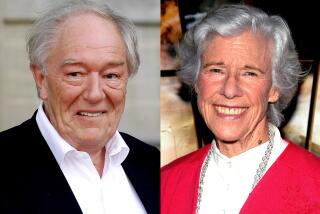Maurice Evans Dies at 87; Brought Shakespeare to TV
- Share via
Maurice Evans, the consummate Shakespearean actor who did as much if not more than anyone to touch the early years of television with Old World grace, has died in a rest home in Brighton, England.
George Schaefer, his longtime friend and associate, said the distinguished actor, who was equally at home as John Tanner in Shaw’s “Man and Superman” or as the Puzzler on television’s “Batman,” was 87 when he died Sunday.
Schaefer, now an associate dean of theater, film and television at UCLA and a former veteran director, said Evans had been inactive in recent years.
“He was living near (his friend) Helen Hayes in Cuernavaca, Mexico, when he had a heart attack,” said Schaefer, who produced “Teahouse of the August Moon,” among many other endeavors with Evans. “He recovered and returned to England and was taking it easy when he developed a bronchial infection last spring. He finally entered the rest home (where he died) last month.”
Evans was a pragmatic actor and producer who once vowed that despite his “artistic pretensions I have no intentions of winding up starving in an attic.”
And of course, he didn’t.
Rooted firmly as a creative force in the theatrical world, Evans traveled widely within that world in roles that ranged from Romeo opposite Katharine Cornell’s Juliet to Sir Basil Bertram in the old “Tarzan” TV series.
He was a French spy on an episode of “Daniel Boone,” a slapstick comic and foil for Red Skelton and Samantha’s frequently absent father on “Bewitched.”
He did the long (five hours with a dinner break in the middle) and short (the so-called boiled-down GI version he first staged for wartime troops and later took to New York) of “Hamlet.”
And he was considered the most tragically effective of all the Richard IIs of the modern era, a triumph he dismissed as simply “a happy meeting of an actor with a part.”
Evans was born in Dorchester, England, the son of a Welsh druggist and part-time justice of the peace who also fashioned himself a dramatist. Young Maurice began acting in his father’s adaptations of Thomas Hardy novels. The boy also had a fair voice and sang in the St. Andrew’s choir in Stoke Newington after the family moved to London.
Evans worked in little theater before making his first professional appearance in Cambridge in 1926. He was Orestes in “The Oresteia,” an auspicious classic debut for an actor whose life would forever be entwined with the classics.
The role of Lt. Raleigh in “Journey’s End” made him a London sensation, and between 1930 and 1934 he appeared in leading roles in about 20 plays in London.
Even then the fiscally conservative Evans was concerned about his finances and--despite the immediate dramatic and monetarily rewarding triumphs--opened up the Nine to Six Cleaners, a dry-cleaning concern to which he devoted his days while acting at night.
He was persuaded by Dame May Whitty to pursue his interest in the classics, and Evans began to act with the Old Vic Theatre portraying such Shakespearean characters as Petruchio, Iago, Hamlet, Richard II and Octavius Caesar in “Antony and Cleopatra.”
Concurrently, he was also learning Bernard Shaw and appeared as the Dauphin in “Saint Joan” and as Adolphus Cusins in “Major Barbara.”
In 1935, Miss Cornell’s husband, Guthrie McClintic, asked Evans to come to America to appear opposite his wife in “Romeo and Juliet.”
Psychologically, he said years later, “I never left.”
He became an American citizen in 1941, after triumphs in “Saint Joan,” “Henry IV, Part I” and “Falstaff.” His five-hour “Hamlet” (with the one-hour dinner intermission) was praised for its “splendid masculinity” by critic James Mason Brown.
Evans worked with Miss Hayes in “Twelfth Night” and with Dame Judith Anderson in “Macbeth.” Years later the two would be reunited in a “Hallmark Hall of Fame” production of that stark drama that remains the definitive television treatment of the classic.
With the outbreak of World War II, the embryonic U.S. citizen became an Army officer asigned to the entertainment section in the Pacific, where he staged about 60 plays, musicals and variety shows.
“Hamlet” went to war in an abridged version seen by thousands of troops, many of whom were getting their first exposure to the Melancholy Dane.
Evans had made films before the war (“White Cargo,” “Scrooge,” etc.) and after (“Androcles and the Lion,” “Planet of the Apes,” “Rosemary’s Baby”) but motion pictures did not enhance the image he had created on the stage and further developed on the smaller screen.
Pulitzer, Tony Awards
In 1953, Evans and his wartime friend Schaefer produced “Teahouse,” a satire about a U.S. Army unit trying to bring democracy to a Pacific island. Starring David Wayne, it ran on Broadway for 1,027 performances and captured the 1954 Pulitzer Prize for drama and a Tony award for the two South Pacific veterans. While “Teahouse” was still thriving, Evans (this time with Emmett Rogers) produced “No Time for Sergeants,” about a hillbilly draftee who nearly brings the Army to its knees.
It ran for nearly two years and made a star of Andy Griffith.
Next, Evans not only acted but also sang as the Rev. Brock in “Tenderloin.” It managed only a six-month Broadway stay.
That was 1960, seven years after Evans had made his most singular and expansive impressions on American television audiences. Beginning in 1953 with “Hamlet,” Evans established a relationship with the “Hallmark Hall of Fame” showcases that are still discussed where TV veterans gather today.
He was Hamlet, Macbeth and Richard II. He brought “Man and Superman,” “Dial ‘M’ for Murder” and “The Tempest” into American homes. And for six wonderful months in 1955-56 he produced “Maurice Evans Presents Hallmark Hall of Fame,” in which “Alice in Wonderland,” “The Corn Is Green,” “The Cradle Song” and several more tasteful specials were aired.
Evans was enchanted by the possibilities of TV.
“It is startling to think,” he said in 1954, “that the TV audiences who will see ‘Macbeth’ probably will be larger than all the combined audiences who have seen the play since Shakespeare wrote it.”
In the 1960s, the last decade in which he was fully active, Evans toured with Miss Hayes in a program of Shakespeare readings but then gradually moved toward retirement.
The slight Welshman with the mellifluous baritone voice re-emerged briefly in 1980 in a tour of “Holiday,” Philip Barry’s 1928 comedy glorifying non-comformity, but that was about all.
He had become “Maur-eece” to millions of Americans but remained “Morris” to those conversant with English tradition. And he believed that he had experienced television in its best times.
“Television has lost its immediacy,” he told The Times toward the end of his career. “When we did the film (as opposed to live) version of ‘Macbeth’ I was mourning over Lady Macbeth before I met her.”
There are no immediate survivors, Schaefer said.
More to Read
The complete guide to home viewing
Get Screen Gab for everything about the TV shows and streaming movies everyone’s talking about.
You may occasionally receive promotional content from the Los Angeles Times.






